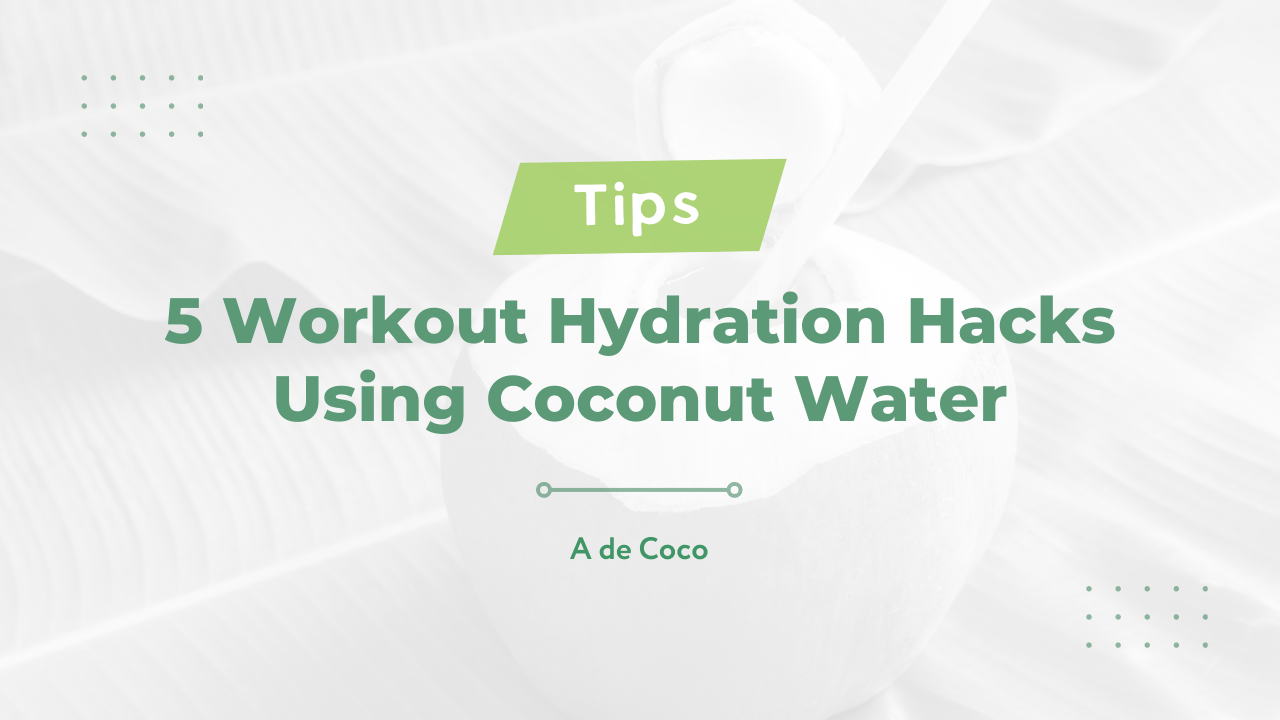Keeping your body adequately hydrated is critical during exercise and fitness workouts.
It optimizes performance, boosts energy levels, and aids in muscle recovery.
Coconut water has emerged as an exceptional natural sports drink due to its impressive nutritional profile.
Being a rich source of electrolytes and offering a decent amount of carbohydrates, it can effectively back up hydration and energy demands during workouts.
This blog will delve into maximizing the benefits of coconut water to support your workout hydration needs.
Let’s dive into the secrets that can make your hydration smarter and workouts more effective.
- Use coconut water as energy boost prior to workout sessions.
- Rehydrate after workouts with chilled coconut water.
- Incorporate coconut water into your protein shake routine.
- Consider freezing coconut water for a chilled electrolyte source.
- Create coconut water ice cubes for immediate refreshment post-exercise.
There’s much more valuable information to uncover in the following sections of this article. We will be exploring additional benefits of incorporating coconut water into your fitness plan, from the specific nutrients it offers to how it compares to traditional sports drinks.
By continuing to read, you’ll broaden your understanding of this natural superdrink and how it can positively impact your health and performance.
Investing a few more minutes to sift through these pages could very well upgrade your workout routine and recovery process to a whole new level. Rest assured, this article has just the right blend of insights and practical tips you won’t want to miss out on.
Workout Hydration Hacks Using Coconut Water
1. Use Coconut Water as a Pre-Workout Energy Boost
In Short: Coconut water, loaded with vital nutrients like potassium and magnesium, can considerably enhance your workout routine as a pre-workout energy boost. Its hydration and muscle function boosting properties can be further enjoyed by incorporating it into a cold drink before workout, adding chia seeds for extra energy, or blending with fruits for a tasty and healthy pre-workout smoothie.
Getting into the fascinating world of workout hydration, one comes across an oft-mentioned ingredient with numerous accolades to its name: coconut water.
Utilizing this tropic wonder in a variety of ways can significantly enhance your workout regimen, starting with its noteworthy use as a pre-workout energy booster.
In essence, coconut water can serve as an effective and efficient fuel source for your muscles as you embark on your grueling training session.
This natural beverage is laden with a rich assortment of nutrients, including vitamins, minerals, antioxidants, and particularly important are its electrolytes which maintain proper hydration and muscle function.
Despite its light and refreshing taste, coconut water is actually a powerhouse of energy, ready to give your body the boost it needs to execute a highly effective workout.
Of its many beneficial components, the presence of potassium plays a pivotal role in making coconut water an effective pre-workout energy boost.
Potassium facilitates muscle contractions, assisting you in carrying out intense physical activities more smoothly.
In addition, coconut water provides an excellent source of magnesium, a mineral essential for energy production and muscle health.
Not only does this hydration hack enhance your physical performance during workout, but also does wonders for your overall health and wellbeing.
Here are a few ways to incorporate coconut water into your pre-workout routine for maximum benefits:
- Drink a glass of cold coconut water before you start your workout. The chilly beverage will help in swiftly hydrating your body and giving you a kick start.
- Consider adding some chia seeds into your coconut water. These tiny seeds further boost your energy levels and keep you going during the workout.
- You can also blend coconut water with your choice of fruits to make a delicious, healthy pre-workout smoothie.
Each of these suggestions provides a unique and enjoyable way to reveive the energy-boosting properties of coconut water.
Beyond the athletic advantages, drinking coconut water prior to workout also aids in boosting metabolism and maintaining optimal health.
Moreover, it is a natural, chemical-free alternative to the commercial pre-workout drinks loaded with artificial sweeteners and additives.
In essence, coconut water delivers a perfect trifecta of health, fitness, and pleasure, making it an ideal addition to your workout routine.
Therefore, don’t shy away from experimenting with coconut water before your next workout and note the remarkable difference it makes.
2. Rehydrate Post-Workout with a Cold Coconut Water
In Short: Cold coconut water is an effective post-workout drink due to its natural electrolyte content, antioxidant properties, and ease on the stomach. Its benefits range from hydration to improved heart health, making it an excellent alternative to commercial sports drinks.
When it comes to post-workout recovery, nothing beats rehydrating your body and replenishing lost electrolytes. One of the most efficient ways to do this is by incorporating cold coconut water into your routine.
After a grueling workout, the body is usually dehydrated and craving replenishment. It is during this window that our bodies are most receptive to nutrients and will absorb them more readily.
Usually, people would reach for sports drinks to relieve this physical state. However, these are often loaded with artificial sweeteners and additives that do more harm than good.
On the contrary, cold coconut water comes with numerous benefits that it’s frequently hailed as ‘Mother Nature’s sports drink’. It is lower in calories, naturally free from fat and cholesterol, and has more potassium than four bananas.
Since it’s naturally refreshing, you might also find that you enjoy drinking coconut water more than regular water, making it easier to meet your hydration needs.
There are a few things about the attributes and benefits of coconut water that makes it an excellent hydrating beverage. Here’s an insight into the properties of coconut water:
- Naturally Loaded with Electrolytes: Coconut water contains important electrolytes like potassium, sodium, and magnesium which are essential for heart health and maintain fluid balance in the body.
- Rich in Antioxidants: Antioxidants in coconut water can neutralize the damaging effects of free radicals, reducing oxidative stress, and boosting overall health.
- Easy on the Stomach: Unlike most commercial sports drinks, coconut water is gentle on the stomach and is easily digestible.
Drinking coconut water post-workout helps to replace the electrolytes that we lose during intense exercise, making it the perfect natural sports drink. Plus, research suggests that it may help to reduce inflammation, which can aid the recovery process.
Not only does coconut water provide a fantastic way to rehydrate swiftly, but it also brings valuable benefits to cardiovascular and kidney health. And let’s not forget: it replenishes the body with important nutrients and enhances athletic performance.
While there is standard water and sports drinks readily available on every corner, the benefits of coconut water make it more desirable as a rehydration drink. Even better, it’s easy to incorporate into your post-workout routine.
To experience the maximum benefit, chill your coconut water in the refrigerator before your workout so that it will be always ready for your use after you finish exercising.
Although the benefits of coconut water are undeniable, it’s important to remember that every person’s hydration needs are unique, and it’s essential to listen to your own body. However, if it fits in with your overall dietary needs and exercise targets, drinking cold coconut water post-workout could be a simple change that makes a big difference to your fitness regimen.
3. Add Coconut Water to Your Protein Shake
In Short: Adding coconut water to your protein shake enhances its nutritional value, providing essential electrolytes which are often lost during exercise and improving the shake’s taste naturally. Regularly incorporating coconut water into your protein shakes not only elevates your workout routine and speeds recovery times but also brings various health benefits such as aiding digestion, supporting cardiovascular health, and boosting the immune system.
Those of us who have ventured into the world of fitness have likely heard about the incredible benefits that protein shakes offer.
However, many may not be fully aware of just how beneficial it can be to add coconut water to your protein shakes.
Essentially, coconut water can take your ordinary, everyday protein shake and turn it into an astonishingly effective fitness booster.
In essence, coconut water is a natural source of essential electrolytes, providing our bodies with an optimal balance of calcium, potassium, and magnesium, among other important minerals.
When we exercise, we lose these important electrolytes through perspiration, and failing to replenish them can cause an array of negative effects, such as muscle cramping and excessive fatigue.
Moreover, coconut water’s naturally sweet taste makes it perfect for flavoring protein shakes in a genuinely healthy and beneficial manner.
Certainly, this versatile liquid offers a healthier alternative to commonly used, artificial sweeteners found in most protein shake mixes.
Let’s dive into some crucial points showcasing why you should give coconut water a try as your protein shake mixer:
- Simple source of Hydration: Coconut water is, essentially, nature’s sport drink. It hydrates the body efficiently and replenishes lost electrolytes during workout sessions.
- Natural Sweetness: Coconut water adds a mild, tropical flavor to protein shakes, making them more deliciously palatable without the negative effects of artificial sweeteners.
- Nutrient-Rich: With its balanced content of important nutrients, coconut water significantly enhances the nutritional value of protein shakes.
Indeed, by taking the simple step of adding coconut water to our protein shakes, we could easily improve our exercise routines, speed up our recovery times, and achieve our fitness goals much more efficiently.
Moreover, opting for coconut water as a mixer can siphon multiple benefits aside from improving your fitness routine. For instance, it could help your digestion, support cardiovascular health, and even provide a boost for your immune system.
Therefore, it’s clear that the advantages of adding coconut water to your protein shake extend beyond just the realms of fitness and workouts.
The health benefits are multi-faceted, making this a movement well worth considering for anyone aiming to develop a more wholesome, balanced, and health-conscious lifestyle.
In short, incorporating coconut water into your protein shakes not only ensures optimal workout hydration but also brings a host of other health benefits.
Pro Tip: Adding coconut water to your protein shake can greatly enhance your fitness routine by providing essential electrolytes lost through perspiration during exercise, increasing the nutritional value of the shake, and offering a healthier, natural sweetness as opposed to artificial sweeteners.
Let me tell you, next time when you prepare your post-workout protein shake, try mixing in some refreshing coconut water.
You may be surprised at just how much of a positive difference this small adjustment can make to your overall fitness regimen and general health.
4. Freeze Coconut Water for a Chilled Electrolyte Source
In Short: Freezing coconut water provides a practical hydration method, serving as a slow, prolonged source of essential electrolytes during and post-workout. Ensure it’s natural and free from additives, then simply freeze it into ice cubes for an easy, versatile fitness hydration strategy.
When we discuss incorporating coconut water into your fitness routine, there’s a cool, versatile method that often goes unnoticed: freezing coconut water for a chilled electrolyte source.
Coconut water is a treasure trove of essential electrolytes – potassium, magnesium, sodium, and calcium – each playing a crucial role in optimal bodily functions.
With workouts contributing to significant loss of these, it’s not just interesting, but crucial to discover fresh ways to replenish electrolytes post-exercise.
The idea of frozen coconut water isn’t just a summer refreshment – it’s a fitness hydration hack that serves multiple purposes.
Let me explain the core benefits of using frozen coconut water as a part of your hydration strategy.
- Prolonged Cooling Effect: First off, frozen coconut water provides a prolonged cooling effect. This comes in handy during or after a grueling workout session where your body temperature rises rapidly.
- Slow Release of Electrolytes: It also ensures a slow but steady release of much-needed electrolytes into your system, keeping you hydrated over a longer span.
- Easy Preparation: Not to overlook the ease of preparation. You only need to pour the coconut water into ice trays and freeze it!
- Convenient Storage: It can also be stored in your freezer for quite a while, so you have a ready source of natural electrolytes whenever needed.
- Easier on The Stomach: Lastly, for those who find room-temperature or cold coconut water a bit heavy on the stomach, consuming it in its frozen form might be a more palatable option.
An essential pointer to remember is to choose 100% natural coconut water – free from added sugars or flavors – to derive the maximum electrolyte benefit.
This method of using coconut water is particularly beneficial if you exercise outdoors during the hotter months. The refreshing chillness of the frozen water not only keeps you cool but it’s delicious too!.
For instance, if you’re going for a run on a summer morning, pop a couple of coconut water ice cubes into your water bottle for a prolonged freshness.
If you’re exercising indoors, you can snack on a few coconut water ice cubes post-workout for a quick boost of electrolytes.
Moreover, the use of frozen coconut water does not restrict your options – get innovative! Make a chilled post-workout smoothie by adding these frozen nuggets into your blender along with fruits of your choice.
Frozen coconut water is an excellent, practical hydration option that blends in with your workout routine while seamlessly providing the essential elements your body needs.
5. Make coconut water ice cubes for instant refreshment
In Short: Coconut water ice cubes are a great workout hydration hack, providing immediate refreshment and important electrolytes like potassium for effective muscle function. They can be simply made at home and added to daily beverages for a hydration boost and impart a refreshing taste.
When it comes to workout hydration, many fitness enthusiasts focus so much on pre-workout and post-workout drinks. But they often overlook one simple and innovative use of coconut water – making coconut water ice cubes.
Using coconut water ice cubes is not only innovative but surprisingly beneficial too. These little cubes of instant refreshment are packed with electrolytes that assist in replenishing the body after a grueling workout session.
As many fitness enthusiasts know, staying hydrated is one of the most important aspects of workout. Instead of plain water ice cubes, switching to coconut water ice cubes can add an extra layer of refreshment to any beverage.
Apart from the refreshing taste, coconut water ice cubes are applauded for their nutritional value. They are a great source of potassium, which aids in balancing sodium levels, supports healthy heart function, and helps your muscles work effectively.
Let’s break down the process on how to make these coconut water ice cubes.
Here are the simple steps involved in making coconut water ice cubes:
- Firstly, you need to buy a good quality fresh coconut water. It is highly recommended to avoid coconut water with added sugars or flavors. The more natural, the better.
- Secondly, pour the coconut water into a clean ice cube tray. Make sure to not fill it to the brim. Leave a little space for the liquid to expand upon freezing.
- Finally, place the tray in the freezer and let it sit for a few hours until the cubes are perfectly frozen.
Now, just because these are workout hydration hacks, don’t limit yourself to only using these coconut water ice cubes post-workout. You can add these cubes into your everyday drinks like smoothies, juices or even in a refreshing iced tea. Besides giving a boost to your hydration, it will also enhance the taste of your drink, making it more enjoyable.
One of the advantages of using coconut water ice cubes is the convenience of having a portable electrolyte source. Whether you’re going for a run in the park, a workout at the gym, or a training session in the field, you can just pop a few cubes into your water bottle for an instant boost.
An important factor to remember is that hydration needs vary from person to person, depending largely on the workout intensity. Make sure you are listening to your body and hydrating as required.
Pro Tip: Using coconut water ice cubes instead of regular ones not only adds a refreshing twist to your workout hydration, but also helps in replenishing your body with essential electrolytes and providing an additional source of potassium which supports a healthy heart function and effective muscle work.
Another great plus of using these ice cubes is that you’re not only staying hydrated during your workout but also uptaking essential nutrients that assist in recovery and muscle health.
Let me tell you, the next time you think about how to up your workout hydration game, remember that a simple change like using coconut water ice cubes can not only improve the hydration process but also add a refreshing twist to your routine.
The Bottom Line
Hydrating the body using coconut water during workouts has a plethora of health benefits.
Not only does it help maintain fluid balance and prevent dehydration, it additionally supplies the body with essential electrolytes.
The natural sweetness offered by coconut water can also serve to curb sugar cravings.
Resorting to the goodness of coconut water thus emerges as an effective, nutrient-rich method of replenishing lost moisture and energy during intensive exercise routines.




